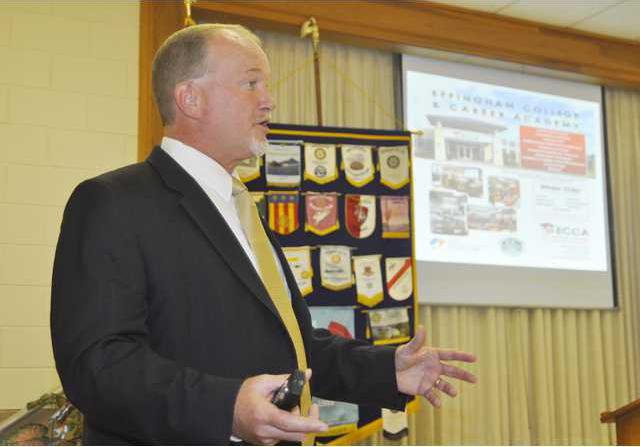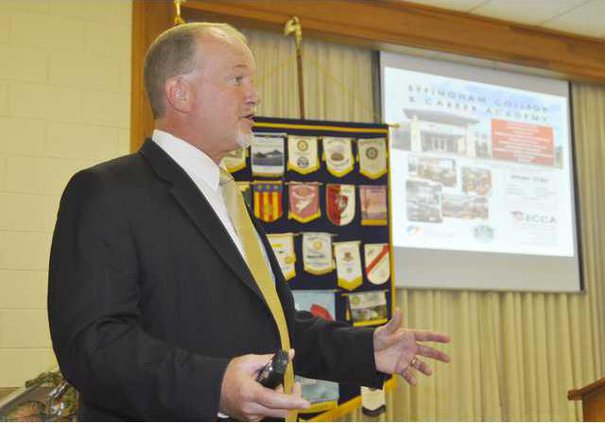Already having increased its enrollment to more than 600 students, the Effingham College and Career Academy has now gotten the attention of Georgia Lt. Gov. Casey Cagle.
ECCA will host the third annual Lt. Governor’s Business and Education Summit on Nov. 14, Effingham County Schools Superintendent Randy Shearouse said at Thursday’s Rotary Club of Effingham meeting.
“It’s going to be great. We’ll get to showcase what we have,” Shearouse said.
He encouraged community leaders to participate in the business and education summit. Rome hosted it the last two years before Cagle opted to bring it to southeast Georgia this year.
“We’re very honored he selected us,” said Effingham College and Career Academy CEO Barbara Prosser.
The summit includes panel discussions and work sessions relating to career and technical education. Along with Cagle, Technical College System of Georgia Commissioner Ron Jackson will attend.
Also at the summit, ECCA will receive its designation as a Ford Next Generation Learning Community, a collaboration with Ford Motor Company to develop innovative learning methods in the school system. It is one of the business and community partnerships the College and Career Academy has developed.
“We’re all in this together,” Shearouse said. “We want (students) to have a great community where we attract industry. It helps everyone. Real estate agents sell houses, and people want to move to Effingham County to raise their kids.”
ECCA students are dual-enrolled at the academy and one of the county’s two schools. Now in its fourth year, ECCA has an enrollment of 638 students, with the most popular programs being health care (203 students), culinary arts (108) and logistics (80).
Enrollment steady, test scores up
Shearouse also shared updated system-wide enrollment numbers, which haven’t changed much from last year. As of last Tuesday, 10,991 students were enrolled in Effingham County’s 13 public schools.
Blandford continues to be the district’s largest elementary school by far, with 840 students. Next is Marlow Elementary with 669.
To free up classroom space at Blandford, the school district moved pre-kindergarten classes from BES to Rincon Elementary last year. Rincon’s enrollment is 493.
“You still have one principal, you still have one counselor, so services are a little different when you have 500 kids compared to 840,” Shearouse said. “So we’re going to have to look at that in the near future as far as kind of balancing those numbers out, and we’ll make sure to give everyone plenty of notice.”
The school district maintains a balanced budget, Shearouse said, despite suffering massive funding cuts from the state. Since 2003, Effingham County has not received nearly $50 million for which it qualified under the state’s QBE (quality basic education) formula.
“I don’t care how you look at it, that’s a lot of money,” Shearouse said.
To offset that, the school system has trimmed from 1,724 employees a few years ago to 1,560. As teachers have retired or moved to other districts, many of their positions have not been filled — resulting in more students per classroom throughout the district.
However, other counties have taken more drastic measures. Shearouse stated that two-thirds of Georgia’s school districts (121 out of 180) have shortened their school year from the traditional 180 days, with some calendars as short as 144 days.
“We have not had any furlough days or calendar reduction days for teachers or students in three years,” he said. “We’ve been able to weather the storm a lot better than others, and it’s because of the decisions that have been made.”
In spite of the state funding cuts, Effingham students continue to do well in the classroom. Shearouse pointed out that the county’s percentage of students meeting or exceeding the standard on this year’s Criterion-Referenced Competency Tests was higher than the state average in every grade level in every subject area. Also, Effingham elementary, middle and high school students scored highly on the College and Career Readiness Performance Index, compared to other districts in the state and First District RESA (Regional Educational Service Agency).
Shearouse shared some statistics that may be surprising, considering Georgia’s $5 billion in cuts statewide to the education formula since 2003. Georgia ranked seventh in the nation in Education Week magazine’s 2013 “quality counts” report, which rates students’ academic performance as well as factors such as school climate, discipline and safety.
In addition, Georgia ranked 12th in the nation last year in the percentage of students scoring a 3, 4 or 5 on Advanced Placement tests. The results were even better among African-American students, with Georgia ranking second in the U.S.
“A lot of folks wouldn’t think that,” Shearouse said of the state’s high national ratings. “I know we’re in the South and a lot of times we kind of have a black eye when you look at scores being reported and what’s being done, but this is some good news.”








